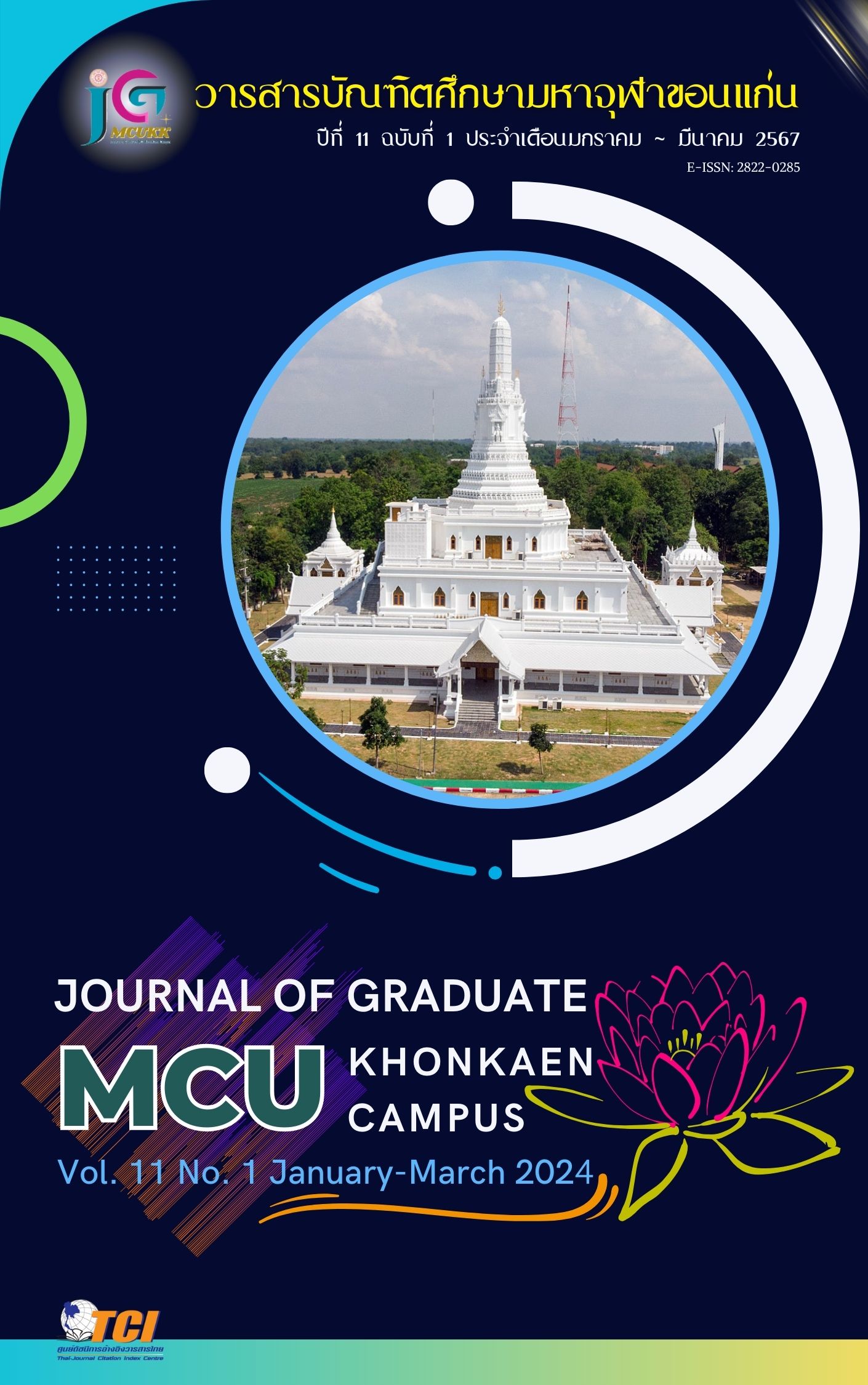Integration of Beliefs that Appeared in The Boon Phawet Tradition According to Theravada Buddhist Philosophy Principle to Promote Tourism in Roi-Et Province
Main Article Content
Abstract
The objectives of this dissertation are 1) to study the concept of beliefs in the Bun Phawet tradition, 2) to study the principles of Theravada Buddhist philosophy that appear in the Bun Phawet tradition, 3) to integrate the beliefs that appear in the Bun Phawet tradition. Phawet according to Theravada Buddhist philosophy to promote tourism in Roi Et Province and 4) to present knowledge about integrating beliefs in the Phawet tradition to promote tourism. In-depth interviews with key informants Total number: 8 pictures/person. Content data were analyzed. Present descriptive information
The results of the research found that: 1. Concepts about beliefs in the Bun Phawet tradition. Roi Et Province It is an important tradition in Buddhism. There is an important activity, which is the presentation of a sermon on the topic "Phawet Sandara Jataka" related to Buddhist principles. The belief and agricultural lifestyle of the Isan people, Bun Phawet, is classified as the 4th heat or Bun Duan Si. The word "Phawet" is in the Isan language. 2. Theravada Buddhist philosophy that appears in the Bun Phawet tradition. Looking at it from an aesthetic point of view regarding beauty or aesthetic value. that focuses on the study of Buddhist aesthetics, with two dimensions of beauty: beauty in the religious dimension and beauty in the worldly dimension. 3. Integrate the beliefs that appear in the Bun Phawet tradition according to Theravada Buddhist philosophy to promote tourism in the province. Roi Et With the principles of Theravada Buddhist philosophy, all 3 theories are motivation theory, happiness theory, Buddhist philosophy principles. 4. Get a new idea called “BBBT MODEL” B = Beliefs, which is the acceptance of reality, real existence, and power, B = Boon Phawet is a tradition of making merit according to the 12 heats, which is done in the fourth month. or make merit at Phawet Listen to the Mahachat sermon, B = Buddhist Philosophy is the principles of Theravada Buddhist philosophy and T = Tourism in Roiet is tourism that comes from the merit-making tradition in Roi Et Province.
Article Details

This work is licensed under a Creative Commons Attribution-NonCommercial-NoDerivatives 4.0 International License.
References
กรมการศาสนา กระทรวงวัฒนธรรม. (2552). พิธีกรรมและประเพณี. กรุงเทพฯ: ชุมนุมสหกรณ์การเกษตรแห่งประเทศไทย จำกัด.
คณะกรรมการจัดงานบุญผะเหวดปี. (2545). สืบสานงานประเพณีบุญผะเหวดจังหวัดร้อยเอ็ด. กาฬสินธุ์: กาฬสินธุ์การพิมพ์.
ปรีชา พิณทอง. (2534). ประเพณีโบราณไทยอีสาน. (พิมพ์ครั้งที่ 7). อุบลราชธานี: ศิริธรรมออฟเซ็ท.
ยศ สันตสมบัติ. (2537). มนุษย์กับวัฒนธรรม. กรุงเทพฯ: มหาวิทยาลัยธรรมศาสตร์.
สวิง บุญเจิม. (2548). ตำรามรดกอีสาน. อุบลราชธานี: มรดกอีสาน.
สำนักงานศึกษาธิการจังหวัดร้อยเอ็ด. (2538). ประเพณีบุญผะเหวดร้อยเอ็ด. กาฬสินธุ์: ประสานการพิมพ์.
พระมหาธวัชชัย เขมธโช (พุทธโส). (2555). การเทศน์มหาชาติที่มีอิทธิพลต่อสังคมไทย. (วิทยานิพนธ์พุทธศาสตรมหาบัณฑิต). พระนครศรีอยุธยา: มหาวิทยาลัยมหาจุฬาลงกรณราชวิทยาลัย.
พระมหาวิเชียร วชิโร (ชาอินทร์). (2555). การศึกษาผลสัมฤทธิ์ผลของการฟังเทศน์ในงานบุญผะเหวด (เทศน์มหาชาติ) จังหวัดร้อยเอ็ด. (วิทยานิพนธ์พุทธศาสตรมหาบัณฑิต). พระนครศรีอยุธยา: มหาวิทยาลัยมหาจุฬาลงกรณราชวิทยาลัย.
พระสมหมาย ปวโร (ติตะปัน). (2555). วรรณกรรมเวสสันดรชาดก. (วิทยานิพนธ์พุทธศาสตรมหาบัณฑิต). พระนครศรีอยุธยา: มหาวิทยาลัยมหาจุฬาลงกรณราชวิทยาลัย.

